Here’s where to be as the moon and meteors show off
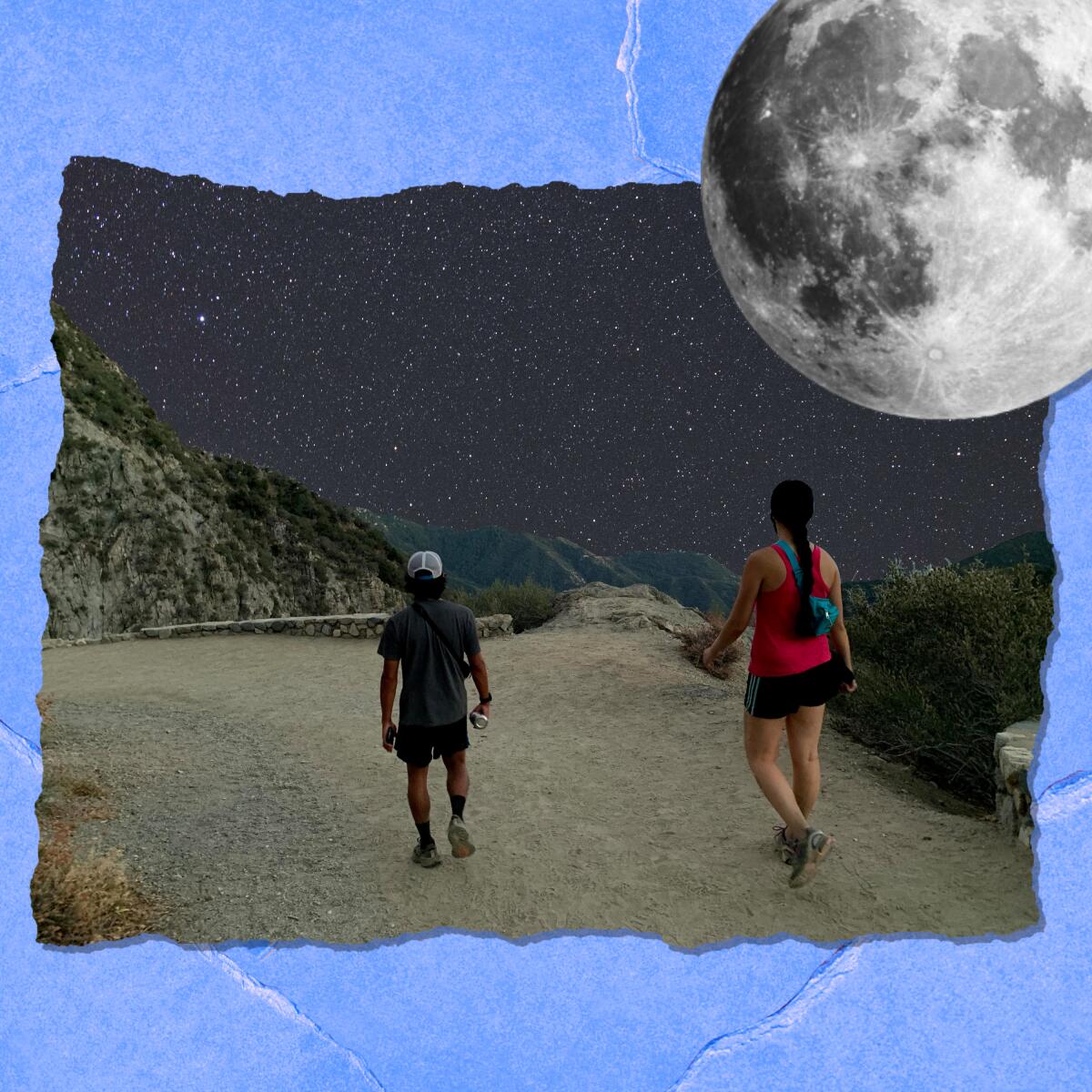
- Share via
Lights, camera, Perseids! It’s that time of year again: Summer’s biggest celestial blockbuster, the Perseids meteor shower, graces the night sky through about Aug. 24. The American Meteor Society forecasts that our planet will be audience to the densest display on Aug. 11 and 12.
The Perseids meteor shower is named after the constellation from which it radiates. (In Greek mythology, Perseus was a son of Zeus and the slayer of the gorgon Medusa.) And although you won’t have to worry about being turned to stone while gazing at the icy, rocky remnants of the comet Swift-Tuttle, other cosmic phenomena will challenge viewers during this year’s extraterrestrial event.
One of those phenomena is the final supermoon showcase of 2022. The Sturgeon Moon occurs as our lunar neighbor appears in full force, its orbit coming closest to our planet just before 7 tonight. There’s nothing wrong with an incredible opening act stealing the show, but it’s important to understand you may not get that perfect Perseids performance you’re hoping for. In recent years, you may have witnessed up to 100 meteors per hour, but this year’s conditions have brought an “mph” that might be familiar to Angelenos from rush hour: NASA clocks the year’s rate at 10 to 20 per hour or fewer. Still, why not revel in the uniqueness?
The early rise of the Sturgeon Moon offers an opportunity for a stellar evening escapade. Get out at sunset to start with a golden-hour romp under a striking, massive orange moon, a showstopper that dominates the twilight before your meteor hunt. The light may never truly dim, but it will surely keep you in awe as you search the sky for the dancing diamond debris — there’s fun in the challenge, after all. With that in mind, these are my favorite three local spots (deserts, mountains, coast — oh my!) for the 2022 Perseids presentation, but any of my classic venues will provide a memorable experience, and you can even catch it virtually!
Get The Wild newsletter.
The essential weekly guide to enjoying the outdoors in Southern California. Insider tips on the best of our beaches, trails, parks, deserts, forests and mountains.
You may occasionally receive promotional content from the Los Angeles Times.
1. Indian Cove Campground, Joshua Tree National Park
I know this summer has been a hot one (what’s new?), but if you can handle the heat, it truly is best to get to the high desert to experience the most memorable meteor moments in SoCal. Anza Borrego State Park is also top-notch, but JTree has my favorite desert campground and is a shorter drive from the city. Indian Cove is a great home base for a trip to the park’s legendary trails (which are all undeniably gorgeous at sunset). It has 101 campsites. Try to snag one next to the colossal rock formations for more starry solitude. Numerous scrambling opportunities are a good supplement to the half-mile interpretive trail under the supermoon.
How to get there: From the town of Joshua Tree, drive east on Highway 62 to the Joshua Tree National Park visitors center (near the intersection of 62 and Park Boulevard), then continue east another 9.2 miles on Highway 62. Turn right onto Indian Cove Road and continue 2.7 miles to the campground.
Parking: Paved lot. No dogs.
2. Mt. Disappointment, Angeles National Forest
What’s in a name? Starting at the Eaton Saddle trailhead, just under 3 miles from the Mt. Wilson Observatory, a 3.5-mile out-and-back sunset hike will net you two peaks, one supermoon and countless meteor viewing opportunities. At just under 6,000 feet, the summit of Mt. Disappointment won’t leave you disappointed. Its star-crossed lover, San Gabriel Peak, actually helps block city lights, and the hike to both provides for a stunning adventure under the full moon. Nearby Mt. Lowe trail camp has five hike-in campsites.
How to get there: Drive 14 miles on the Angeles Crest Highway (California 2) from the 210 Freeway. Turn right onto Mt. Wilson/Red Box Road and continue 2.3 miles to the Eaton Saddle trailhead.
Parking: Two small dirt lots, free. Dog-friendly.
3. Castro Crest, Santa Monica Mountains
Malibu Creek State Park is an ideal setting for any night-sky viewing. There’s relatively low light pollution even though it’s so accessible via every Angeleno’s favorite coastal thoroughfare, Pacific Coast Highway. (It’s not far from the 101, either.) There’s also incredible hiking; the trek to Castro Crest via Corral Canyon is my favorite. During a workout on the Bulldog loop, the iconic sandstone slabs offer excellent resting spots. Lie down with a blanket (or simply on the geological mattress) to enjoy the sky after a classic coastal sunset over the Pacific Ocean. You can also opt for the Malibu Creek State Park campground, which features 63 sites and an open meadow prime for tree-free Perseids viewing.
How to get there: From Pacific Coast Highway, take Corral Canyon Road for 12 miles north to the Corral Canyon trailhead.
Parking: Dirt lot, free. Dog-friendly.
Our daily news podcast
If you’re a fan of this newsletter, you’ll love our daily podcast “The Times,” hosted every weekday by columnist Gustavo Arellano, along with reporters from across our newsroom. Go beyond the headlines. Download and listen on our App, subscribe on Apple Podcasts and follow on Spotify.
4 things to do this week
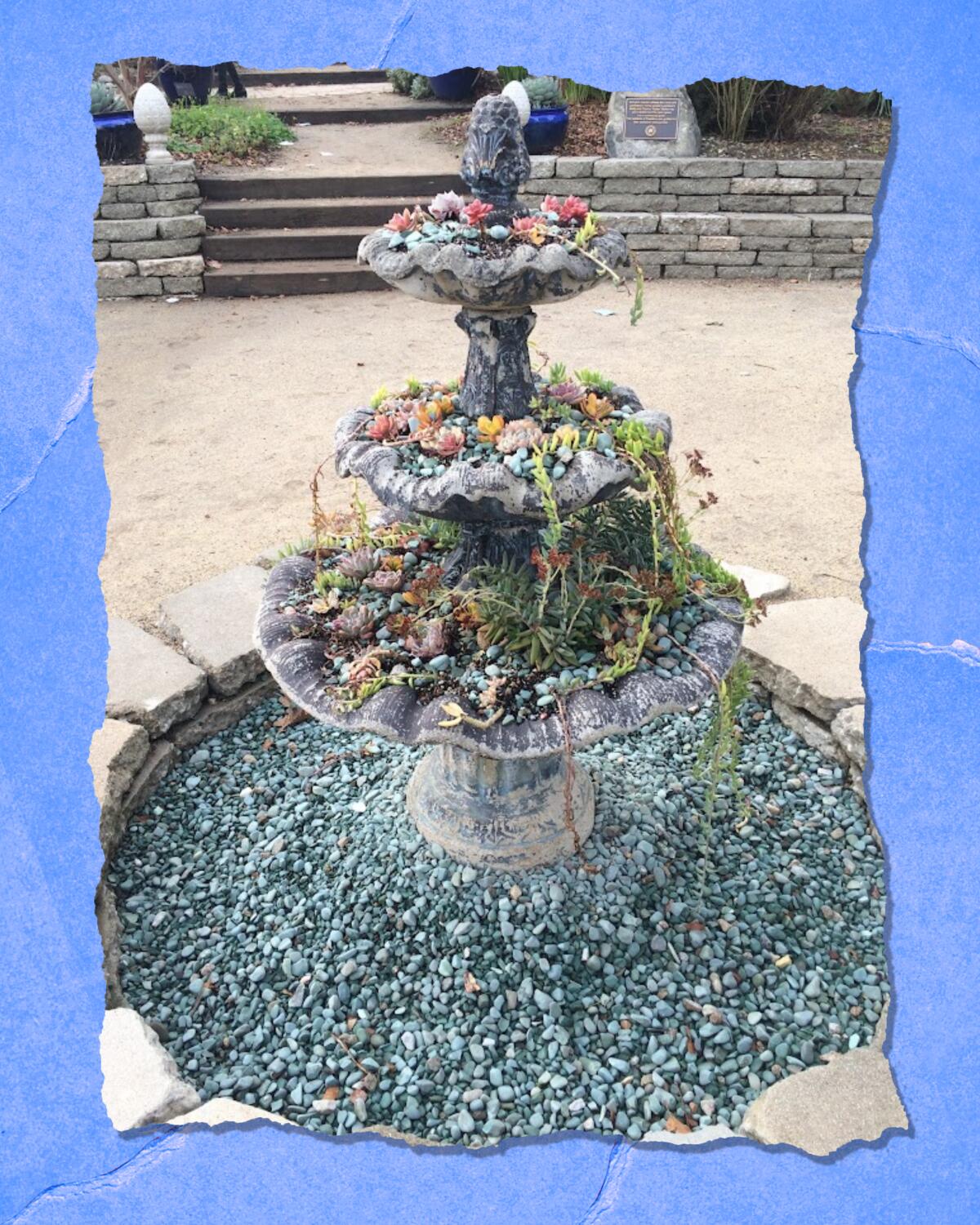
1. Practice regenerative gardening at Arlington Garden in Pasadena. As part of its Weekend Projects series, the “climate-appropriate habitat garden” hosts biweekly volunteer programs focused on connecting with nature and learning natural processes to care for garden landscapes. On Sunday from 9 a.m. to 12 p.m., get educated on how to update irrigation systems to save water while helping maintain this beautiful three-acre gem.
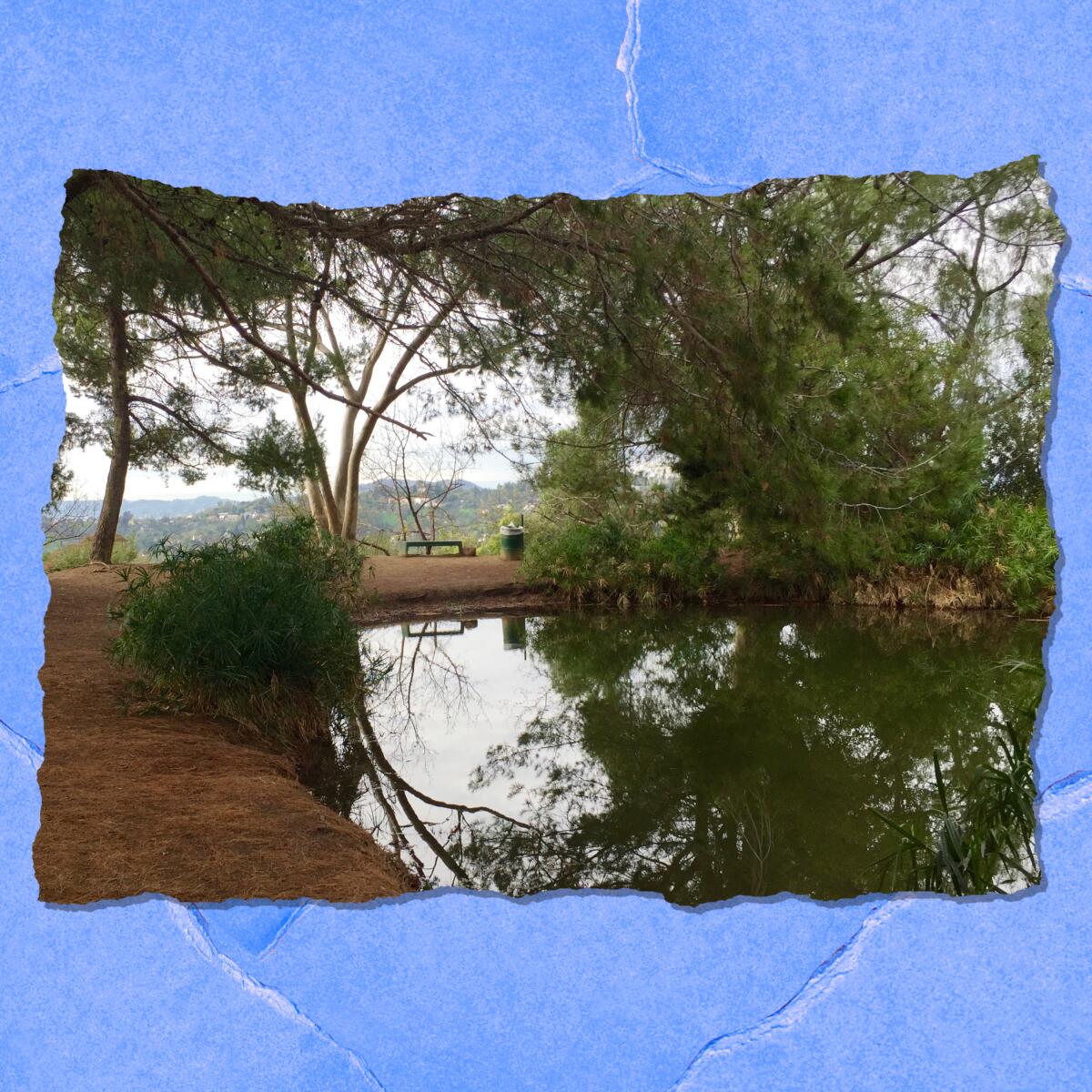
2. Support bird populations through habitat restoration at Ernest E. Debs Park. An event hosted by the Audubon Center at Debs Park in Highland Park invites you to “come get your hands dirty” to restore the environments of the area’s winged residents. On Friday from 8 to 11 a.m., volunteers will plant native plants, remove invasive plants, collect data, and water and mulch existing habitats. Sign a waiver here and get out there to help our local flying friends.
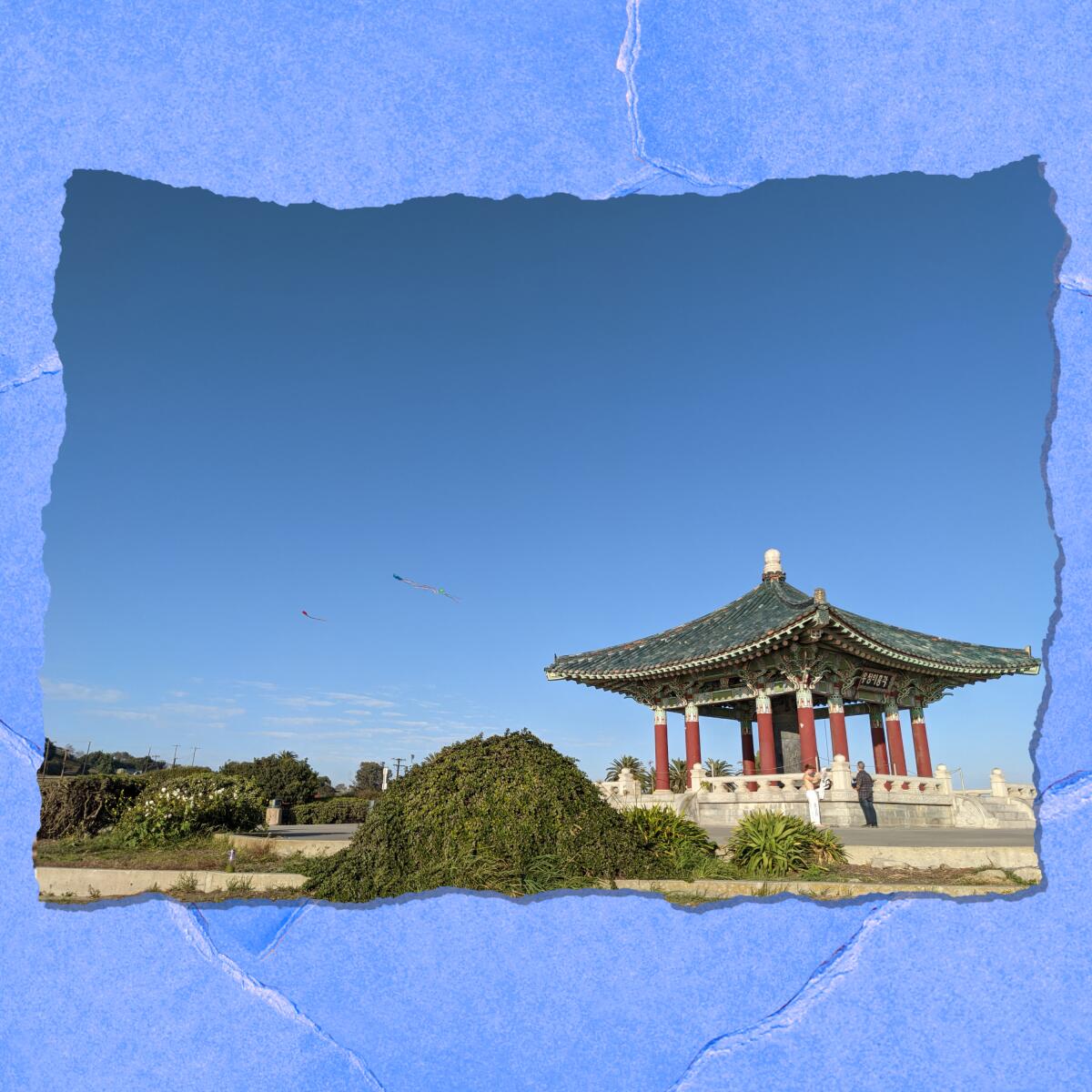
3. Celebrate our connection to all things wild at a Day in Nature in San Pedro. Presented by the L.A. County Parks and Recreation Department, a Day in Nature at the Deane Dana Friendship Natural Area is a wonderful weekend event for nature lovers of all kinds. From 10 a.m. to 3 p.m. on Saturday, head to the green space’s Nature Center for offerings including “live animal ambassador presentations,” story time, crafts, live entertainment, a guided hike, community booths and plant giveaways. Oh, yeah, and panoramic ocean vistas too! Afterward, you can head to neighboring Angels Gate Park, where you’ll find more epic views, soaring peregrine falcons and the Korean Friendship Bell, a monument symbolizing the U.S. and South Korea’s peaceful relations.
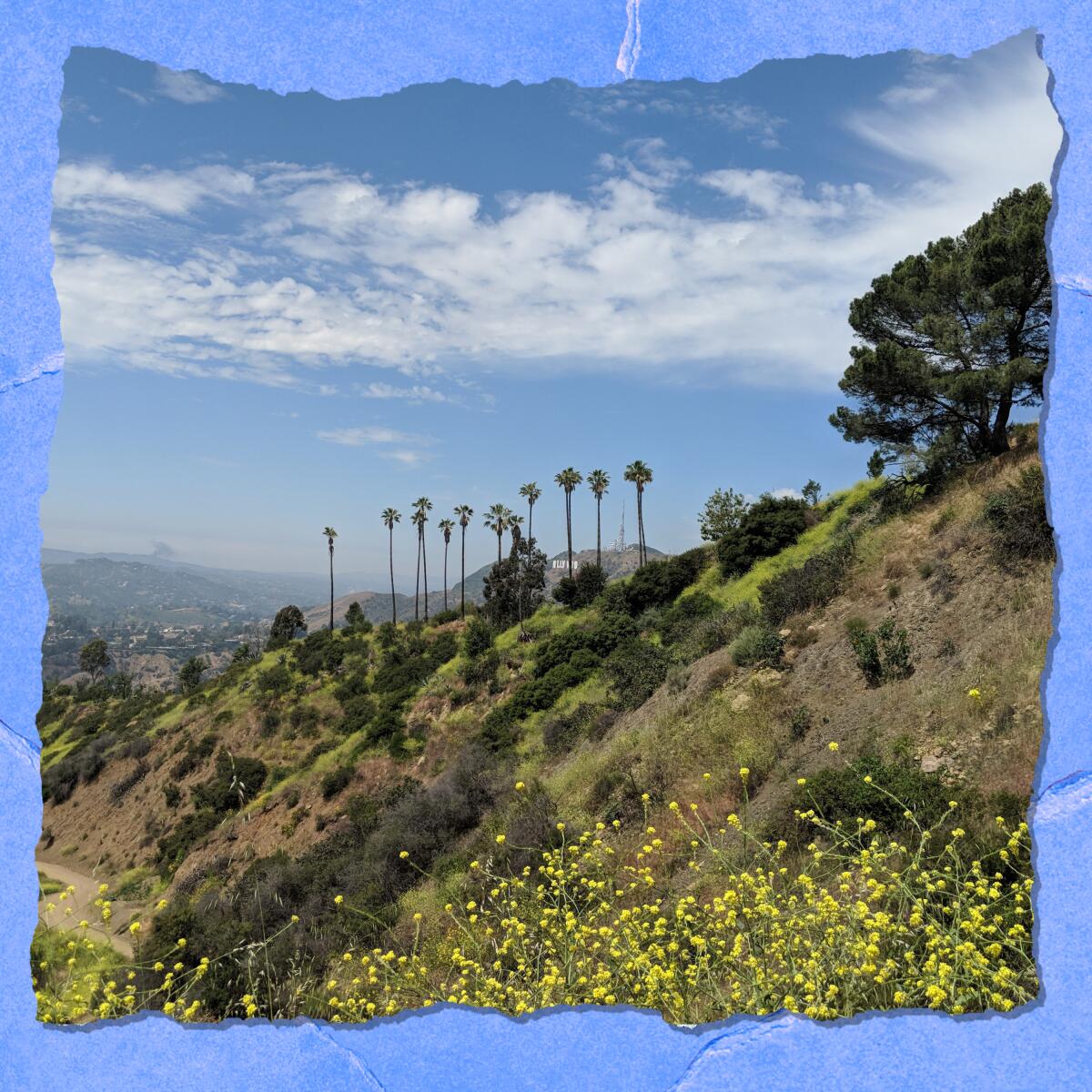
4. Hike for herbs in Griffith Park. Whether you’re a botanical buff, a floral fanatic or simply an Angeleno who wants to get outside and reconnect with nature this weekend, consider joining Herb Club L.A. at the city’s premiere park for an evening herb walk Sunday from 6:30 to 8:30 p.m. Register here to receive the details and bring writing materials, cameras, snacks and water for an educational journey to learn about the local flora and “become a better land steward.”
Hike of the week
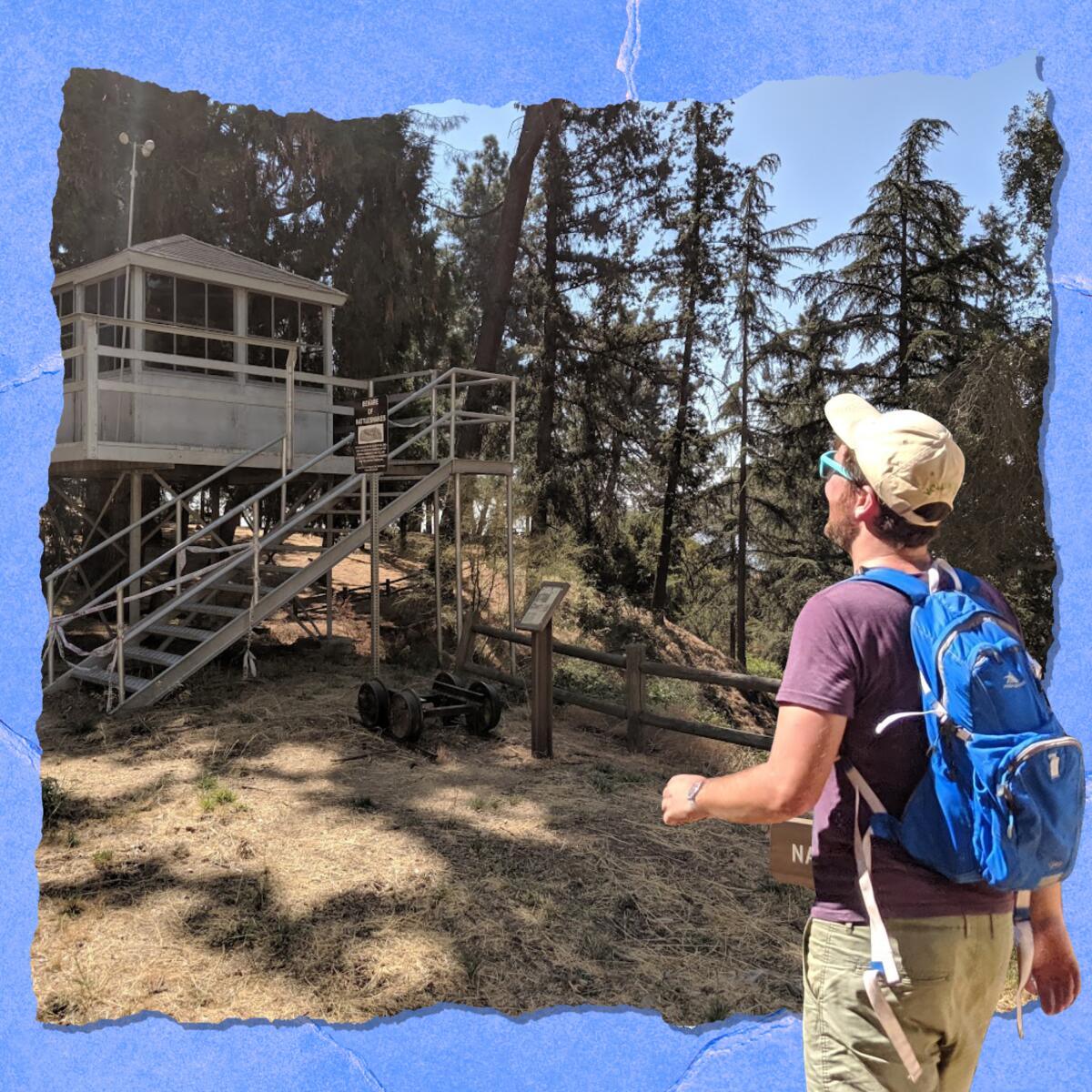
There’s no denying it: We are officially in wildfire season. This weekend, honor the volunteers who staff Southern California observation towers with a trip to take in a bit of fire lookout history in the San Gabriels. The 5.9-mile out-and-back gut-busting journey to Henninger Flats (featured among our 50 best hikes in L.A.) is an accessible gem that features a great workout, epic valley vistas and a generous grove of pines at its nature center 2,600 feet above sea level. (Note: The campground is currently closed.) Start early at the Mt. Wilson toll road gate to beat the heat and, after crossing a bridge, ignore the path descending to the far more popular Eaton Canyon. You’ll instead ascend 1,400 feet via a historic fire road that has benches where you can rest your legs and enjoy the views, which stretch to the downtown skyline and beyond. At Henninger Flats, you’re rewarded with towering pines, picnic tables and the old Castro Peak fire lookout tower. The 20-foot steel relic served the Santa Monica Mountains from 1925 to 1971 before it was relocated. Now, it’s a prime educational (and photogenic) spot and a reminder of the greatest threat to our forests. To see an operational fire tower in the neighboring San Bernardino National Forest, consider the trek to Strawberry Peak near Lake Arrowhead.
The must-read
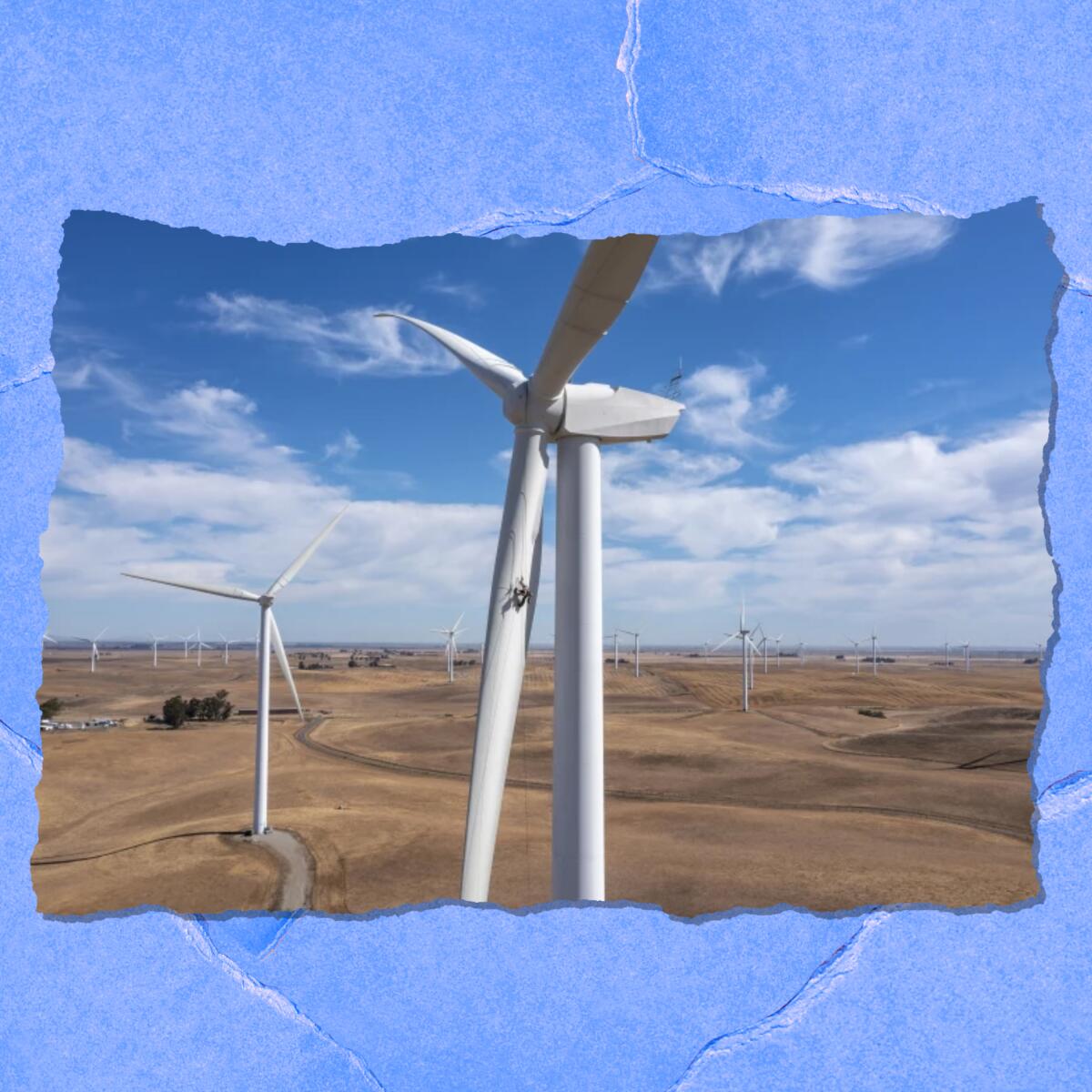
Amount of support dollars for climate and clean energy programs? 370 billion. Percentage decrease of greenhouse gas emissions by the end of the decade? 40. Marathon negotiation hours needed last weekend in the Senate? 27. Senate passage of the most significant federal bill combating climate change in history? Possibly priceless. Early Sunday, the Inflation Reduction Act passed with a 51-50 vote in the Senate, ending “decades of inaction on the climate crisis,” writes the Times’ Boiling Point newsletter writer, Sammy Roth. The bill will provide unparalleled stimulation to renewable energy initiatives and technologies, but developing infrastructure, responding to opposition and finding good sites for huge projects like wind turbines and solar panels will be a challenge. The next step for the bill, which also lowers drug prices and raises corporate taxes, is a probable vote in the House of Representatives on Friday.
The red flag

With lower adoption rates and limited funding, animal shelters across Los Angeles are getting more and more crowded — and it’s a doggone shame. Times writer Karen Garcia notes that economic and staffing challenges are affecting our furry best friends as they await adoption, but there are ways for pet lovers to help. Garcia gives a rundown of the needs of both public and private nonprofit shelters, which welcome both onsite help (like walking and playtime sessions) and remote help (think administrative work). Training and time commitments are often required, but a little effort can go a long way in supporting the animals.
Cool stuff
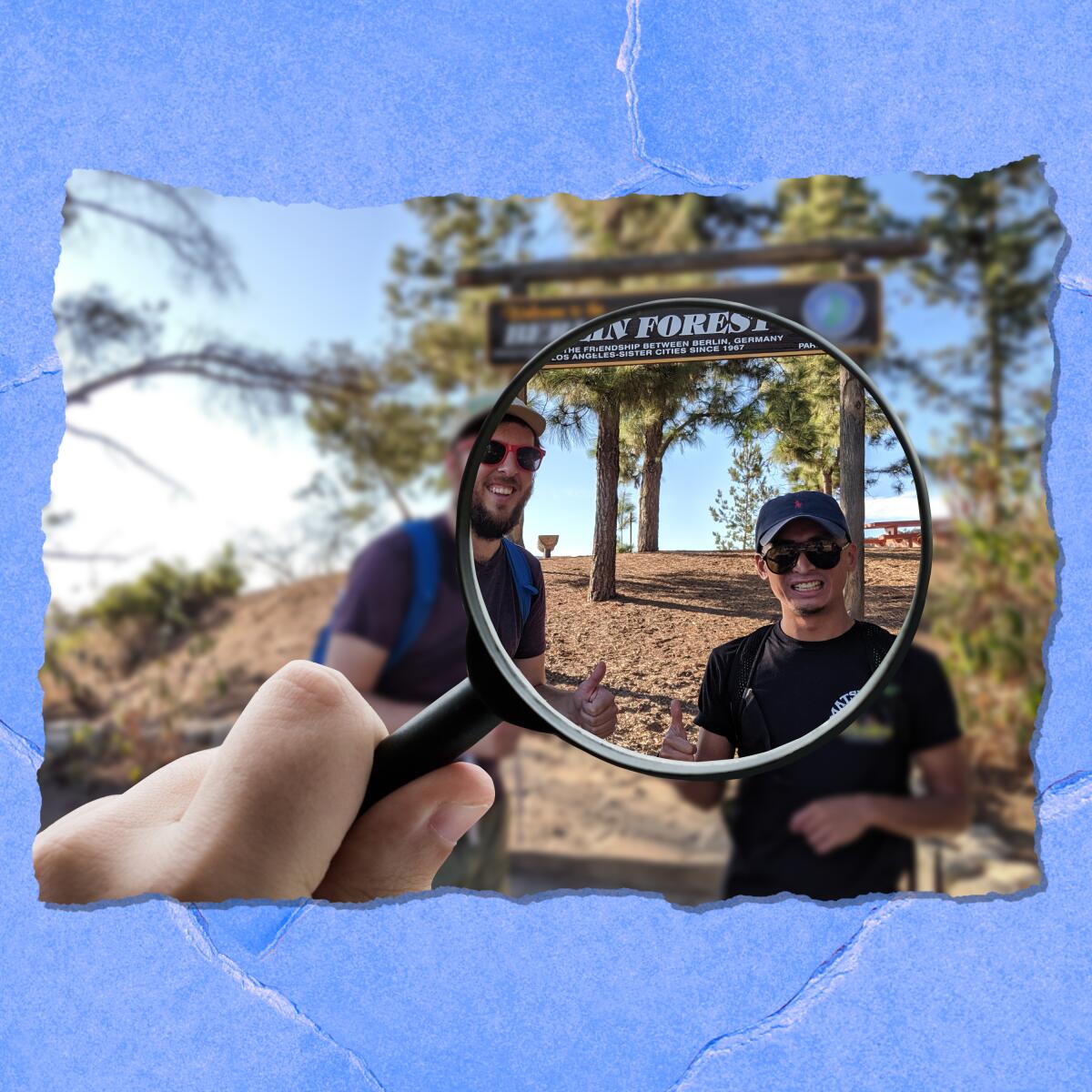
Small is the new big. And although the recent “shrinkflation” phenomenon may annoy you, downsizing can be a good thing for Angelenos. Recognizing the need for natural space in our crowded city, native-plant horticulturist Katherine Pakradouni thinks about the small amid the huge fight against climate change and mass extinctions. Times writer Jeanette Marantos talks to Pakradouni about her concept of micro forests, “plots of land as small as 10 by 10 feet devoted to dense, multilayer plantings of indigenous shrubs and trees.” These green spaces serve as key habitats and a way for humans to support local wildlife. Pakradouni, who designed and built L.A.’s first micro forest project in Griffith Park, provides a manual for planting your own native micro forest, which starts with a native oak. (Also noted: Leaf litter is important.) You can learn more at a webinar at 7:30 tonight with Pakradouni and the Southern California Horticultural Society. A website is coming soon.
P.S.
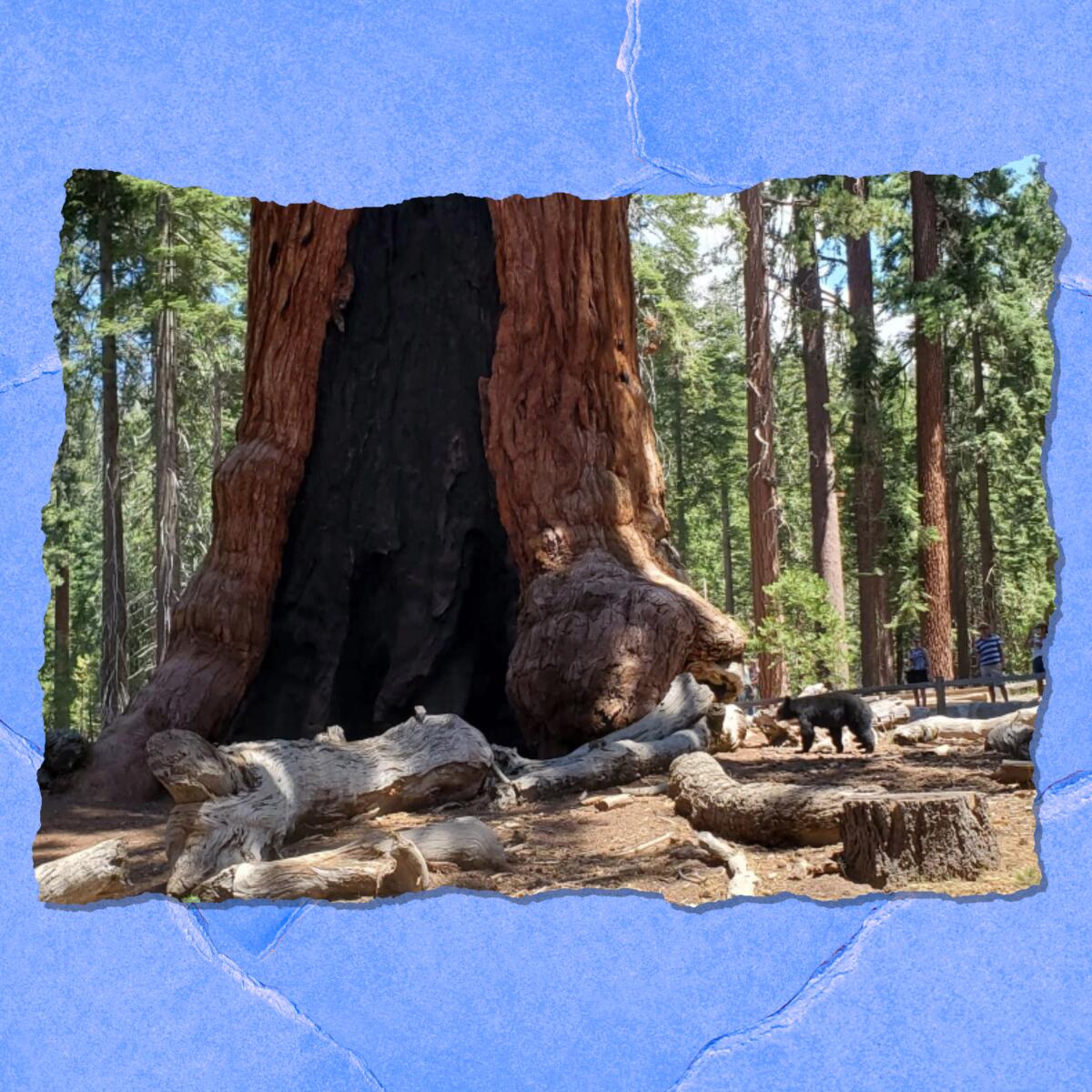
Just three weeks ago, I wrote about the possibility of losing a national park marvel, the Mariposa Grove in Yosemite. Last week, Times writer Itzel Luna wrote about its glorious reopening. The grove, full of 500 centuries-old giant sequoias, survived the nearby Washburn fire (nearly 5,000 acres) after incredible firefighting efforts. The even larger Oak fire (nearly 20,000 acres northeast of Mariposa) threatened the park, too, but as of Monday was 94% contained. Though a few trails in the Mariposa Grove area remain closed, visitors can now enjoy the arboreal wonders via a variety of popular paths, like the 2-mile Grizzly Giant Loop Trail (the eponymous tree is over 3,000 years old!). If you plan on celebrating the post-burn return with a tree trek, plan ahead: The park currently requires reservations for most day-trip visitors through Sept. 30.
Sign up for The Wild
We’ll help you find the best places to hike, bike and run, as well as the perfect silent spots for meditation and yoga.
You may occasionally receive promotional content from the Los Angeles Times.




